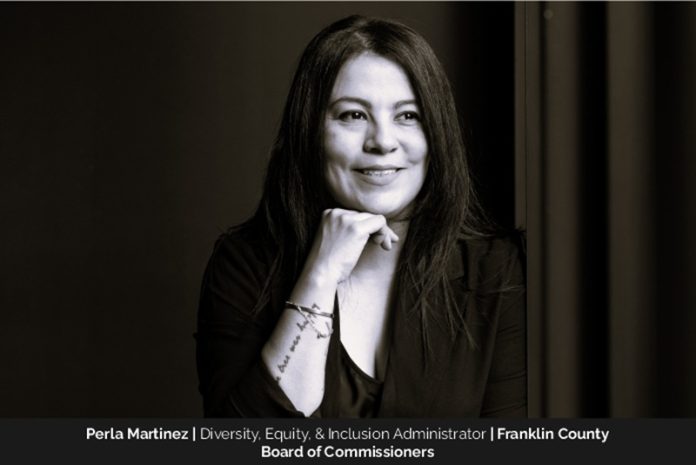In a time when diversity, equity, and inclusion (DEI) are the keys to organizational and societal success, leadership from champions such as these is imperative. Perla Martinez, Franklin County Board of Commissioners Diversity, Equity, and Inclusion Administrator is one such visionary. Her journey from Mexico to becoming a regarded DEI leader is one of resilience, commitment, and passion for dismantling systems of oppression.
From Mexico to the United States: A Personal Journey of Resilience
Perla Martinez’s path to DEI leadership is highly personal. Born in Mexico, she began as an English as a Second Language teacher in rural schools. The work highlighted the power of education to transform lives and the systemic issues that excluded so many students from realizing their potential.
Perla immigrated at 23 to the United States, where she first worked as a preschool teacher and eventually started a childcare business. Along the way, she saw firsthand the deep disparities that immigrant and working-class families experienced in gaining access to basic services. As an immigrant from Mexico, a queer woman, and a mother herself, those disparities were personal. “I had an idea of what it felt like to be working in systems that were not created for someone like me,” she explains. Those experiences charged her with the desire to campaign on the kind of systemic change she wanted, and they set her on the path to a career in DEI.
Championing Equity: A Career Dedicated to Inclusion
Perla started out in education, but her commitment to serving disenfranchised groups led her into public service. She worked at the Franklin County Domestic and Juvenile Court, where she created and implemented the Language Services Program to provide equal access to legal representation for non-English speakers and the deaf. “It was one of my first big opportunities to close equity gaps at an institutional level,” she says.
Her dedication to equity and inclusion only deepened when she moved into Program Administrator for the Franklin County Board of Commissioners’ Office of Diversity, Equity, and Inclusion. There she spearheaded the County Futures workforce project, assisting citizens in finding a place in the organization by ability and potential, not by past. She later became the DEI Administrator, reaching even wider by introducing programs with the objective of building inclusion in the government framework.
Leading with Purpose: A Day in the Life of Perla Martinez
No two days are ever alike for Perla Martinez. Her work is program and policy development, training development and council facilitator. “Some days I am facilitating our Racial Equity Council; other days I am in meetings with leaders debating how we can most effectively serve marginalized employees,” she says. Her primary responsibilities are chairing the Racial Equity Council, coordinating and hosting several webinars, implementation of DEI training programs, and enforcing DEI-informed policies.
“Each day is about making progress so that DEI isn’t merely talked about but actually drives the way we do business as a county government,” Perla affirms.
Balancing DEI and Personal Life: A Delicate Dance
It’s difficult to balance such a demanding DEI career with private life, particularly when work is so closely integrated with one’s own identity. “The emotional labor of repeatedly educating, promoting change, and working through resistance can be draining,” she acknowledges.
To stay grounded, Perla has established intentional boundaries, takes care of herself by engaging in therapy and coaching, and finds strength in her community. “I celebrate small wins and finally, I practice joyful resistance, because liberation isn’t just about struggle; it’s also about joy, celebration, and thriving,” she says.
Leading the Next Wave: Empowering Future Generations
Perla imagines a future where DEI is an embedded principle in decision-making across all levels of an organization. Her impact is not only seen in policy change but also in shifting attitudes and cultures to prioritize inclusion. “If I can assist in making government more equitable, accessible, and just, then I will know that my work has set the stage for a future where equity is a daily way of life,” she asserts.
Perla encourages emerging DEI leaders or practicioners to keep pushing and leverage their lived experiences. “There will be those days when the work is draining, when change is slow, and when setbacks try your patience. But progress is made by those who will not quit,” she claims. She also references the strength of vulnerability and authenticity in advocacy and in relationship-building. “Inclusion begins with leaders who are willing to be themselves,” she claims. Creating alliances and finding mentors are also essential.
“A project of this nature can’t be accomplished alone. Seek mentors, get in touch with community partners, and involve those who share your vision,” Perla recommends.
Milestones of Progress: Recalling Notable Accomplishments
Perla’s most fulfilling accomplishments throughout her years have been those with concrete, long-lasting impacts. Winning the Employee of the Year (2024) award and the Excellence in Public Service Award were acts of affirmation that legitimized her work. But the true accomplishment is in the programs, policies, and system changes she has hard a part in.
“These accomplishments are important because they are not about me – they are about our ODEI team here in the Board of Commissioners and everyone who works hard every day to make our residents lives easier, they are about those whose voices have been heard, and whose rights have been protected because of the work we are doing together,” Perla says. Perla is also sure of the level of trust that she has been given to get things done and feels privileged to be working with an organization and a team that believes in enhancing people’s lives.
The Future of DEI in Franklin County
Perla pictures a Franklin County where equity is not merely policy but practice that shapes decision-making at all levels. “We must embed DEI in our organization’s DNA,” she cites County Administrator Kenneth Wilson. Her vision is to embed DEI in recruitment practices, procurement policies, budget priorities, community engagement, and legislative advocacy.
“Franklin County can serve as a model for how government can lead with equity-first policies,” Perla contends.
To this end, she is working towards institutionalizing equity in county policy and budget and fostering community engagement and accessibility, education and leadership development, and partnership with external organizations. “With the excellent support of the Commissioners and County Administration, I believe Franklin County is poised to be a national leader in equity-driven governance,” she says.
Conclusion
Perla Martinez’s path from Mexico to a senior DEI position in the United States is a compelling demonstration of how one’s own life experience can drive a passion for change at the system level. Her work at the Franklin County Board of Commissioners is not about policies and programs; it’s about building a legacy that empowers future generations. As she keeps advocating for equity and inclusion, her vision and commitment are an inspiration to everyone who wants to create a difference around diversity, equity and inclusion.





